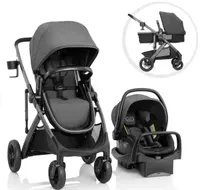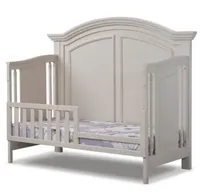Prices on Baby Essentials Are Up — and More Increases May Be Coming
Baby and infant essentials are already seeing price hikes. Here’s what’s going up, and how tariffs could add even more pressure.

Profit and prosper with the best of Kiplinger's advice on investing, taxes, retirement, personal finance and much more. Delivered daily. Enter your email in the box and click Sign Me Up.
You are now subscribed
Your newsletter sign-up was successful
Want to add more newsletters?

Delivered daily
Kiplinger Today
Profit and prosper with the best of Kiplinger's advice on investing, taxes, retirement, personal finance and much more delivered daily. Smart money moves start here.

Sent five days a week
Kiplinger A Step Ahead
Get practical help to make better financial decisions in your everyday life, from spending to savings on top deals.

Delivered daily
Kiplinger Closing Bell
Get today's biggest financial and investing headlines delivered to your inbox every day the U.S. stock market is open.

Sent twice a week
Kiplinger Adviser Intel
Financial pros across the country share best practices and fresh tactics to preserve and grow your wealth.

Delivered weekly
Kiplinger Tax Tips
Trim your federal and state tax bills with practical tax-planning and tax-cutting strategies.

Sent twice a week
Kiplinger Retirement Tips
Your twice-a-week guide to planning and enjoying a financially secure and richly rewarding retirement

Sent bimonthly.
Kiplinger Adviser Angle
Insights for advisers, wealth managers and other financial professionals.

Sent twice a week
Kiplinger Investing Weekly
Your twice-a-week roundup of promising stocks, funds, companies and industries you should consider, ones you should avoid, and why.

Sent weekly for six weeks
Kiplinger Invest for Retirement
Your step-by-step six-part series on how to invest for retirement, from devising a successful strategy to exactly which investments to choose.
Preparing for a new baby can quickly get expensive, which is why parents-to-be often search for sales, start buying essential baby items well in advance and rely on the generosity of friends and family at baby showers.
But now, thanks to President Donald Trump’s sweeping tariffs, the price of baby items could get higher than ever, straining budgets and making buying essentials even more challenging.
With potential tariffs going into effect in a matter of weeks, it could be time to start shopping now if you want to take advantage of current pricing on baby and infant gear.
From just $107.88 $24.99 for Kiplinger Personal Finance
Become a smarter, better informed investor. Subscribe from just $107.88 $24.99, plus get up to 4 Special Issues

Sign up for Kiplinger’s Free Newsletters
Profit and prosper with the best of expert advice on investing, taxes, retirement, personal finance and more - straight to your e-mail.
Profit and prosper with the best of expert advice - straight to your e-mail.
How tariffs could impact the price of baby and infant items
In his first 100 days in office, Trump quickly started implementing tariffs targeting countries including Canada, Mexico and China.
The biggest toll came in early April, when Trump implemented a 20% tariff plus a 125% reciprocal tariff on China. According to The White House, the 20% tariff was to address the fentanyl crisis.
Such steep tariffs on China spell trouble for anyone purchasing baby items, whether that’s parents or friends and family who will be buying baby shower gifts.
According to a LinkedIn post by ImportGenius, 97% of strollers and 87% of car seats sold in the United States come from China, meaning the price of these already expensive items is going to substantially increase.
Many other baby items also come from China. Expect to see climbing prices on cribs, nursery furniture, baby clothes, high chairs, toys, swings and more.
UPAAbaby has already acknowledged the tariffs, noting that updated pricing will go into effect soon across most of their products, though they have tried to absorb as much of the price increase as possible.
The tariffs will impact American retailers selling products from China, too. Products that retailers have already purchased before the tariffs were implemented should be unaffected, but once retailers have to buy additional goods, they’ll need to pay the higher tariffs, driving up product costs.
The stroller that folds in two directions — parent-facing or forward-facing. The Pivot Suite Modular Travel System with LiteMax Infant Car Seat in Devon Gray is versatile.
How much are tariffs increasing the price of baby and infant items?
In June 2025, the Joint Economic Committee - Minority released a report analyzing how tariffs are increasing the price of baby and infant items. The report found that between April 1 and June 9, the price of five common items purchased for new babies increasd by 24%, or $98.
From April 1 to June 9, prices on these popular items have all increased:
- Graco SnugRide Lite LX Infant Car Seat increased by $43.01 to $139
- AirClub Bassinet Bedside Sleeper increased by $10.09 to $109.98
- Summer Infant Ingenuity 3Dquickclose CS+ Compact Fold Stroller increased by $20 to $99
- Evenflo 4-in-1 Eat & Grow Convertible High Chair increased by $15.02 to $64.99
- HelloBaby No WiFi Baby Monitor increased by $10 to $89.99
How tariffs could impact everyday prices
While tariffs are poised to drive up baby gear costs, they’ll have wider-spread effects, too. Northeastern Local News reports that even if Trump were to repeal the tariffs, they have a ripple effect.
Electronics, apparel and toys are likely to see some of the highest price increases from the Chinese tariffs.
The Center for American Progress reports that the average American household could pay approximately $4,600 more each year due to the tariffs.
If a retailer fully passes the cost of a tariff onto consumers, an iPhone could double in cost. Imported grocery items, like bananas, coffee and nuts, could rise in price by 10%.
Middle-class family budgets are already feeling the pinch from inflated prices, including higher food costs. If the cost of everyday goods rise, consumer spending could slow in other sectors, too.
As tariff prices make their way through the supply chain, consumers should start to see higher prices in mid-May. Some speculate that such prices could contribute to a recession.
Investor’s Business Daily reports that most shipments out of China to major United States retailers have stopped, and the amount of cargo that will arrive in the Port of Los Angeles next week will decline by about 35%.
Not only could the shipping decline lead to empty shelves, but it could result in domestic freight and retail layoffs that would also contribute to a recession.
Smart ways to shop around higher costs with tariffs on the horizon

With potential higher costs on the way, it’s time to shop smart. If you anticipate needing products that will be impacted by the tariffs, such as baby items, try to buy them early before the prices increase.
That means you should be shopping now, if at all possible. Watch for retailer discounts or club deals at warehouses like Costco and Sam’s Club.
Looking forward, try to buy products made in the United States if possible. Even these products may increase in price if manufacturers use raw goods or components manufactured in other countries, but the increases should be less than what you would pay for items fully manufactured outside of the United States.
Consider second-hand options for lightly used baby gear, like high chairs or cribs, but be cautious with any safety items like car seats. Car seats also expire, so they’re an item that you may just have to buy in advance of the price increases.
While the tariffs will certainly make buying baby items more expensive, planning ahead and shopping smart can help take some of the sting out of the price increases.
Stocking up on some of the larger, more expensive items you need could save you hundreds of dollars once tariffs affect prices, plus you’ll get the bulk of your shopping out of the way.
RELATED CONTENT
Profit and prosper with the best of Kiplinger's advice on investing, taxes, retirement, personal finance and much more. Delivered daily. Enter your email in the box and click Sign Me Up.

Paige Cerulli is a freelance journalist and content writer with more than 15 years of experience. She specializes in personal finance, health, and commerce content. Paige majored in English and music performance at Westfield State University and has received numerous awards for her creative nonfiction. Her work has appeared in The U.S. News & World Report, USA Today, GOBankingRates, Top Ten Reviews, TIME Stamped Shopping and more. In her spare time, Paige enjoys horseback riding, photography and playing the flute. Connect with her on LinkedIn.
-
 Quiz: Do You Know How to Avoid the "Medigap Trap?"
Quiz: Do You Know How to Avoid the "Medigap Trap?"Quiz Test your basic knowledge of the "Medigap Trap" in our quick quiz.
-
 5 Top Tax-Efficient Mutual Funds for Smarter Investing
5 Top Tax-Efficient Mutual Funds for Smarter InvestingMutual funds are many things, but "tax-friendly" usually isn't one of them. These are the exceptions.
-
 AI Sparks Existential Crisis for Software Stocks
AI Sparks Existential Crisis for Software StocksThe Kiplinger Letter Fears that SaaS subscription software could be rendered obsolete by artificial intelligence make investors jittery.
-
 One of the Most Powerful Wealth-Building Moves a Woman Can Make: A Midcareer Pivot
One of the Most Powerful Wealth-Building Moves a Woman Can Make: A Midcareer PivotIf it feels like you can't sustain what you're doing for the next 20 years, it's time for an honest look at what's draining you and what energizes you.
-
 I'm a Wealth Adviser Obsessed With Mahjong: Here Are 8 Ways It Can Teach Us How to Manage Our Money
I'm a Wealth Adviser Obsessed With Mahjong: Here Are 8 Ways It Can Teach Us How to Manage Our MoneyThis increasingly popular Chinese game can teach us not only how to help manage our money but also how important it is to connect with other people.
-
 Looking for a Financial Book That Won't Put Your Young Adult to Sleep? This One Makes 'Cents'
Looking for a Financial Book That Won't Put Your Young Adult to Sleep? This One Makes 'Cents'"Wealth Your Way" by Cosmo DeStefano offers a highly accessible guide for young adults and their parents on building wealth through simple, consistent habits.
-
 My Spouse and I Are Saving Money for a Down Payment on a House. Which Savings Account is the Best Way to Reach Our Goal?
My Spouse and I Are Saving Money for a Down Payment on a House. Which Savings Account is the Best Way to Reach Our Goal?Learn how timing matters when it comes to choosing the right account.
-
 We're 78 and Want to Use Our 2026 RMD to Treat Our Kids and Grandkids to a Vacation. How Should We Approach This?
We're 78 and Want to Use Our 2026 RMD to Treat Our Kids and Grandkids to a Vacation. How Should We Approach This?An extended family vacation can be a fun and bonding experience if planned well. Here are tips from travel experts.
-
 My First $1 Million: Retired From Real Estate, 75, San Francisco
My First $1 Million: Retired From Real Estate, 75, San FranciscoEver wonder how someone who's made a million dollars or more did it? Kiplinger's My First $1 Million series uncovers the answers.
-
 To Love, Honor and Make Financial Decisions as Equal Partners
To Love, Honor and Make Financial Decisions as Equal PartnersEnsuring both partners are engaged in financial decisions isn't just about fairness — it's a risk-management strategy that protects against costly crises.
-
 Top 5 Career Lessons From the 2026 Winter Olympics (So Far)
Top 5 Career Lessons From the 2026 Winter Olympics (So Far)Five lessons to learn from the 2026 Winter Olympics for your career and finances.

